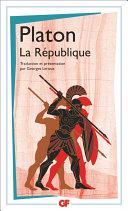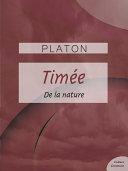Timaeus
Œuvres

Phèdre
PlatonPlaton citations célèbres
“Une vie sans examen ne vaut pas la peine d'être vécue.”
Apologie de Socrate
La République
Phaedrus
Citations sur les hommes et les garçons de Platon
La République
La République
Platon Citations
Platon: Oeuvres complètes - Les 43 titres
Platon: Oeuvres complètes - Les 43 titres
Platon: Citations en anglais
Attributed to Plato in Confidence : How to Succeed at Being Yourself (1987) by Alan Loy McGinnis, this is probably a paraphrase of a statement which occurs in Letter of Advice to a Young Gentleman Leaving the University Concerning His Behaviour and Conversation in the World (1907) by Richard Lindgard: "Take heed of playing often or deep at Dice and Games of Chance, for that is more chargeable than the seven deadly sins; yet you may allow yourself a certain easie Sum to spend at Play, to gratifie Friends, and pass over the Winter Nights, and that will make you indifferent for the Event. If you would read a man’s Disposition, see him Game; you will then learn more of him in one hour, than in seven Years Conversation, and little Wagers will try him as soon as great Stakes, for then he is off his Guard."
Variants:
You can learn more about a person in an hour of play than in a year of conversation.
Attributed to Plato in Food Is the Frosting-Company Is the Cake (2007) by Maggie Marshall
You learn more about a person in an hour of play than in a year of conversation.
Attributed to Plato by former Alaska Gov. Sarah Palin, as quoted in "Aspiring philosopher Palin quotes 'Plato'" (9 July 2009) http://thinkprogress.org/2009/07/09/palin-plato/
Misattributed
Often attributed to Plato, it cannot be found in any of his writings. http://languagelog.ldc.upenn.edu/nll/?p=796
Misattributed
A speech of Aspasia, recounted by Socrates, as portrayed in the dialogue.
Menexenus
Contexte: p>Let every man remind their descendants that they also are soldiers who must not desert the ranks of their ancestors, or from cowardice fall behind. Even as I exhort you this day, and in all future time, whenever I meet with any of you, shall continue to remind and exhort you, O ye sons of heroes, that you strive to be the bravest of men. And I think that I ought now to repeat what your fathers desired to have said to you who are their survivors, when they went out to battle, in case anything happened to them. I will tell you what I heard them say, and what, if they had only speech, they would fain be saying, judging from what they then said. And you must imagine that you hear them saying what I now repeat to you:Sons, the event proves that your fathers were brave men; for we might have lived dishonourably, but have preferred to die honourably rather than bring you and your children into disgrace, and rather than dishonour our own fathers and forefathers; considering that life is not life to one who is a dishonour to his race, and that to such a one neither men nor Gods are friendly, either while he is on the earth or after death in the world below.Remember our words, then, and whatever is your aim let virtue be the condition of the attainment of your aim, and know that without this all possessions and pursuits are dishonourable and evil.For neither does wealth bring honour to the owner, if he be a coward; of such a one the wealth belongs to another, and not to himself. Nor does beauty and strength of body, when dwelling in a base and cowardly man, appear comely, but the reverse of comely, making the possessor more conspicuous, and manifesting forth his cowardice.And all knowledge, when separated from justice and virtue, is seen to be cunning and not wisdom; wherefore make this your first and last and constant and all-absorbing aim, to exceed, if possible, not only us but all your ancestors in virtue; and know that to excel you in virtue only brings us shame, but that to be excelled by you is a source of happiness to us.And we shall most likely be defeated, and you will most likely be victors in the contest, if you learn so to order your lives as not to abuse or waste the reputation of your ancestors, knowing that to a man who has any self-respect, nothing is more dishonourable than to be honoured, not for his own sake, but on account of the reputation of his ancestors.The honour of parents is a fair and noble treasure to their posterity, but to have the use of a treasure of wealth and honour, and to leave none to your successors, because you have neither money nor reputation of your own, is alike base and dishonourable.And if you follow our precepts you will be received by us as friends, when the hour of destiny brings you hither; but if you neglect our words and are disgraced in your lives, no one will welcome or receive you. This is the message which is to be delivered to our children.</p
“Pleasure, a most mighty lure to evil.”
Section 69d (W. R. M. Lamb's translation); also rendered: pleasure, "the bait of sin" (W.A. Falconer's translation).
Timaeus
“Be kind, for everyone you meet is fighting a hard battle.”
Attributed to Plato in No Ordinary Moments: A Peaceful Warrior's Guide to Daily Life (1992) by Dan Millman. It has also been wrongly attributed to Philo. It is a variant of the Christmas message "Be pitiful, for every man is fighting a hard battle," written by the Scottish preacher Ian Maclaren (also known as John Watson) in 1897.
Be Kind; Everyone You Meet is Fighting a Hard Battle. Plato? Philo of Alexandria? http://quoteinvestigator.com/2010/06/29/be-kind/
Misattributed
275c, as translated by Joe Sachs in introduction to Aristotle's Physics: A Guided Study (2011), p. 1
Phaedrus
A speech of Aspasia, recounted by Socrates, as portrayed in the dialogue.
Menexenus
Contexte: Let every man remind their descendants that they also are soldiers who must not desert the ranks of their ancestors, or from cowardice fall behind. Even as I exhort you this day, and in all future time, whenever I meet with any of you, shall continue to remind and exhort you, O ye sons of heroes, that you strive to be the bravest of men. And I think that I ought now to repeat what your fathers desired to have said to you who are their survivors, when they went out to battle, in case anything happened to them. I will tell you what I heard them say, and what, if they had only speech, they would fain be saying, judging from what they then said. And you must imagine that you hear them saying what I now repeat to you:
Sons, the event proves that your fathers were brave men; for we might have lived dishonourably, but have preferred to die honourably rather than bring you and your children into disgrace, and rather than dishonour our own fathers and forefathers; considering that life is not life to one who is a dishonour to his race, and that to such a one neither men nor Gods are friendly, either while he is on the earth or after death in the world below.
Remember our words, then, and whatever is your aim let virtue be the condition of the attainment of your aim, and know that without this all possessions and pursuits are dishonourable and evil.
For neither does wealth bring honour to the owner, if he be a coward; of such a one the wealth belongs to another, and not to himself. Nor does beauty and strength of body, when dwelling in a base and cowardly man, appear comely, but the reverse of comely, making the possessor more conspicuous, and manifesting forth his cowardice.
And all knowledge, when separated from justice and virtue, is seen to be cunning and not wisdom; wherefore make this your first and last and constant and all-absorbing aim, to exceed, if possible, not only us but all your ancestors in virtue; and know that to excel you in virtue only brings us shame, but that to be excelled by you is a source of happiness to us.
And we shall most likely be defeated, and you will most likely be victors in the contest, if you learn so to order your lives as not to abuse or waste the reputation of your ancestors, knowing that to a man who has any self-respect, nothing is more dishonourable than to be honoured, not for his own sake, but on account of the reputation of his ancestors.
The honour of parents is a fair and noble treasure to their posterity, but to have the use of a treasure of wealth and honour, and to leave none to your successors, because you have neither money nor reputation of your own, is alike base and dishonourable.
And if you follow our precepts you will be received by us as friends, when the hour of destiny brings you hither; but if you neglect our words and are disgraced in your lives, no one will welcome or receive you. This is the message which is to be delivered to our children.
“Oh dear Pan and all the other Gods of this place, grant that I may be beautiful inside.”
279 – a prayer of Socrates, as portrayed in the dialogue.
Phaedrus
Contexte: Oh dear Pan and all the other Gods of this place, grant that I may be beautiful inside. Let all my external possessions be in friendly harmony with what is within. May I consider the wise man rich. As for gold, let me have as much as a moderate man could bear and carry with him.
178c, M. Joyce, trans, Collected Dialogues of Plato (1961), p. 533
The Symposium
258d (tr. Benjamin Jowett)
paraphrased in Zen and the Art of Motorcycle Maintenance by Robert M. Pirsig: "And what is good, Phaedrus, and what is not good—need we ask anyone to tell us these things?"
Phaedrus
183e, M. Joyce, trans, Collected Dialogues of Plato (1961), p. 537
The Symposium
Gorgias
Alcibiades I
Gorgias
Section 28c http://www.perseus.tufts.edu/hopper/text?doc=Perseus:text:1999.01.0180:text=Tim.:section=28c, Greek http://www.perseus.tufts.edu/hopper/text?doc=Perseus%3Atext%3A1999.01.0179%3Atext%3DTim.%3Asection%3D28c as quoted in The Watchtower, 2015, 2/15, pp. 19–23 http://wol.jw.org/en/wol/d/r1/lp-e/2015127
Timaeus
Socrates speaking to Alcibiades
Alcibiades I


